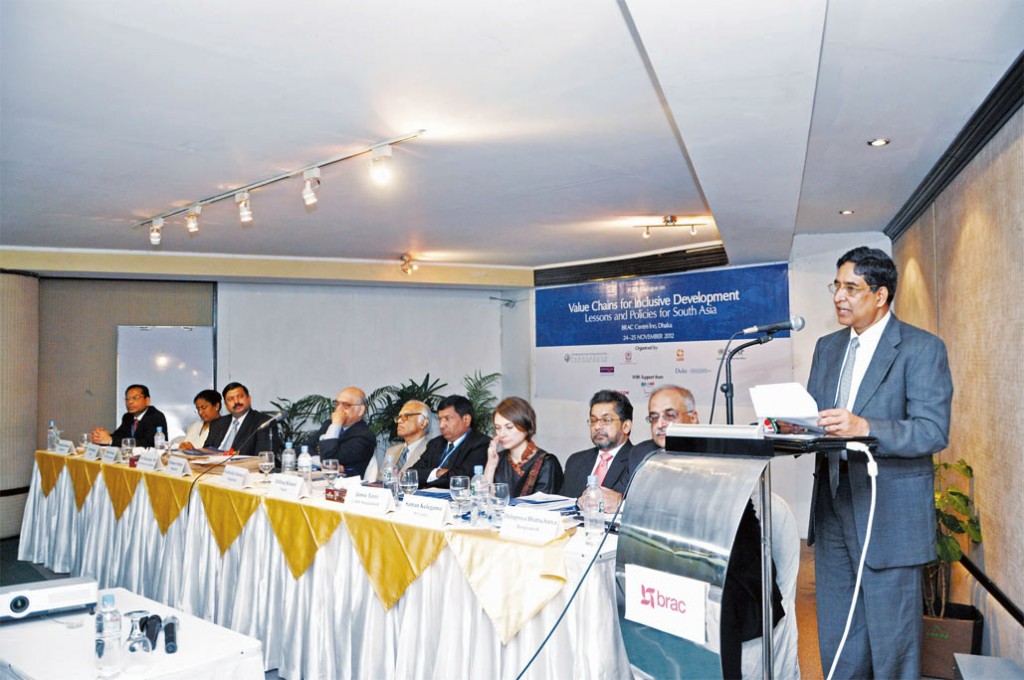As trade is increasingly being carried out through global value chains (GVCs), there is a need to make these work in a manner which will lead to more inclusive and equitable growth and sustainable development. Experts said this in a two-day international conference on Value Chains for Inclusive Development: Lessons and Policies for South Asia. CPD organised this event in collaboration with the Institute for Human Development (IHD), New Delhi; CARE Bangladesh; United Nations Economic and Social Commission for Asia and the Pacific (UN-ESCAP), South and South-West Asia Sub-regional Office (SRO-SSWA), New Delhi; Manchester University; and Centre on Globalization, Governance & Competitiveness, Duke University on 24-25 November 2012 at the BRAC Centre Inn. The Inaugural Session included launching of UN-ESCAP’s Regional Cooperation for Inclusive and Sustainable Development: South and South-West Asia Development Report 2012-2013. Professor Rehman Sobhan, Chairman, CPD chaired this session while Dr Muhammad Abdur Razzaque, MP, Hon’ble Minister for Food, Government of Bangladesh attended as the Chief Guest.
The international conference took place with an objective to discuss the roles, recent trends and associated mechanisms of GVCs for the inclusive developments particularly in the South and South East Asian countries.
The conference consisted of two plenary sessions and six parallel sessions. The plenary sessions focused on Global Value Chains and Inclusive Development, and Women and Value Chains in the New Asia. The six parallel sessions were clustered under two broad areas namely ‘product specific’ and ‘cross-cutting’. The product specific discussions covered Asian experiences in value chain in the areas such as clothing and sports goods; electronic hardware and manufacturing; agro-foods; and offshore services. Discussions on the cross-cutting issues stressed on lead firms’ initiative and responsibilities; and moving up value chains: learning, innovation and building.
The conference also discussed how economic and social upgrading of workers and small producers can be promoted and how sustainable value chains can provide more effective routes for inclusive development. Inclusion of women in the value chain was particularly emphasised. Discussants highlighted the issues related to workers’ rights and safety and proposed various measures. Suggestions to strengthen national capabilities with regard to innovation system, frugal engineering, strengthening the trade unions and extension of regional cooperation were also put forward by the experts in the discussion. For doing all these a great deal of policy efforts are required, remarked the participants.
The Closing Session of the conference concentrated on the policy implications of the conference, and was chaired by Professor Mustafizur Rahman, Executive Director, CPD, while Dr A B Mirza Azizul Islam, former Advisor to the Caretaker Government was present as the Special Guest. Various policy recommendations drawn from the conference were presented by Professor Dev Nathan, Visiting Professor, IHD and Visiting Research Fellow, Duke University, USA.
A total of 71 participants including distinguished economists, academics, media representatives, members of civil society, development partners, business leaders and leading lawmakers from (alphabetically) Australia, Bangladesh, China, India, Maldives, Nepal, Pakistan, The Philippines, Sri Lanka and UK attended the conference.


